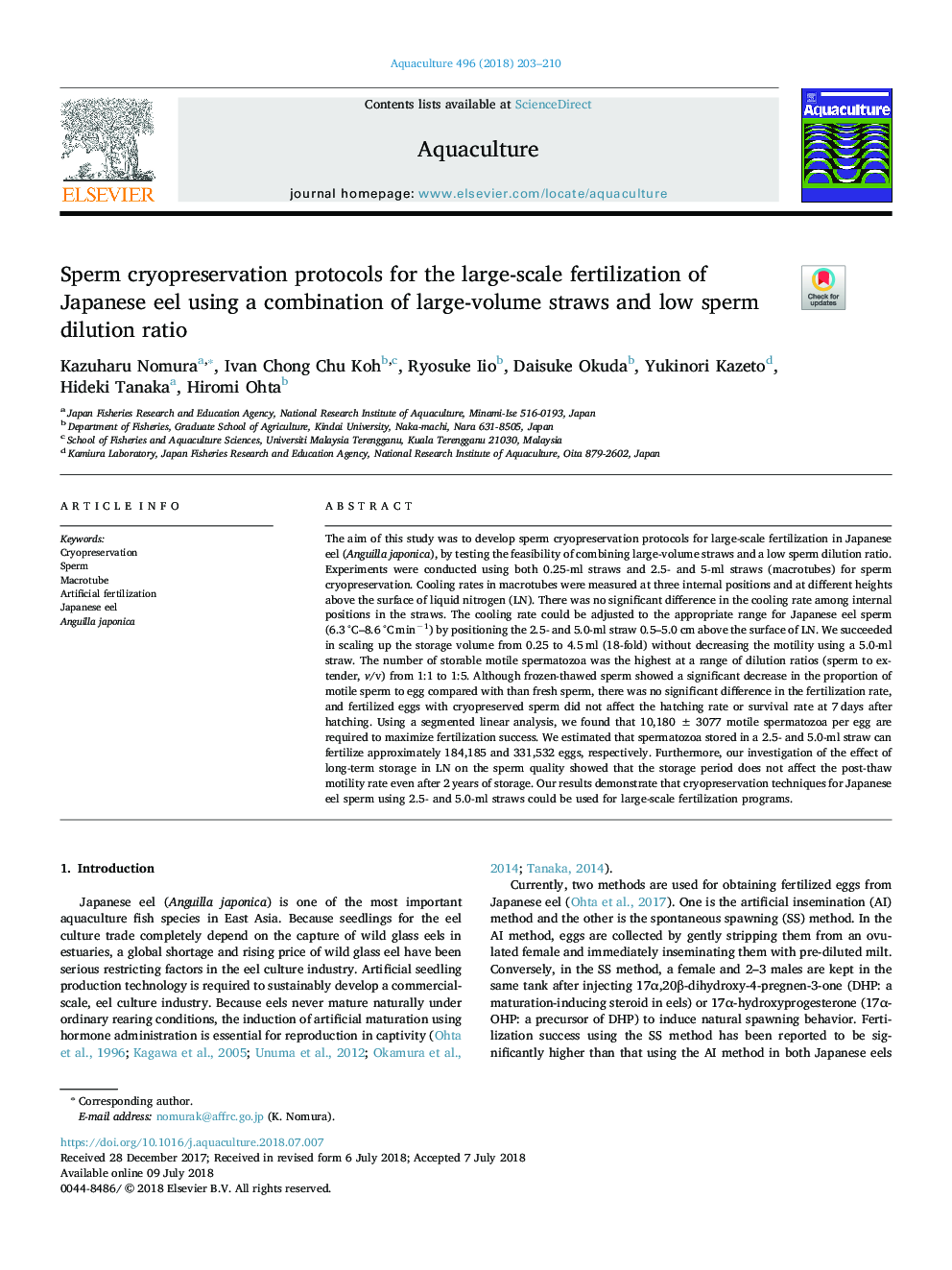| کد مقاله | کد نشریه | سال انتشار | مقاله انگلیسی | نسخه تمام متن |
|---|---|---|---|---|
| 8492956 | 1552792 | 2018 | 8 صفحه PDF | دانلود رایگان |
عنوان انگلیسی مقاله ISI
Sperm cryopreservation protocols for the large-scale fertilization of Japanese eel using a combination of large-volume straws and low sperm dilution ratio
ترجمه فارسی عنوان
پروتئین فریزر اسپرم برای باروری در مقیاس بزرگ قورباغه ژاپنی با استفاده از ترکیبی از نی های بزرگ و نسبت رقیق شدن کم اسپرم
دانلود مقاله + سفارش ترجمه
دانلود مقاله ISI انگلیسی
رایگان برای ایرانیان
کلمات کلیدی
موضوعات مرتبط
علوم زیستی و بیوفناوری
علوم کشاورزی و بیولوژیک
علوم آبزیان
چکیده انگلیسی
The aim of this study was to develop sperm cryopreservation protocols for large-scale fertilization in Japanese eel (Anguilla japonica), by testing the feasibility of combining large-volume straws and a low sperm dilution ratio. Experiments were conducted using both 0.25-ml straws and 2.5- and 5-ml straws (macrotubes) for sperm cryopreservation. Cooling rates in macrotubes were measured at three internal positions and at different heights above the surface of liquid nitrogen (LN). There was no significant difference in the cooling rate among internal positions in the straws. The cooling rate could be adjusted to the appropriate range for Japanese eel sperm (6.3â¯Â°C-8.6â¯Â°Câ¯minâ1) by positioning the 2.5- and 5.0-ml straw 0.5-5.0â¯cm above the surface of LN. We succeeded in scaling up the storage volume from 0.25 to 4.5â¯ml (18-fold) without decreasing the motility using a 5.0-ml straw. The number of storable motile spermatozoa was the highest at a range of dilution ratios (sperm to extender, v/v) from 1:1 to 1:5. Although frozen-thawed sperm showed a significant decrease in the proportion of motile sperm to egg compared with than fresh sperm, there was no significant difference in the fertilization rate, and fertilized eggs with cryopreserved sperm did not affect the hatching rate or survival rate at 7â¯days after hatching. Using a segmented linear analysis, we found that 10,180â¯Â±â¯3077 motile spermatozoa per egg are required to maximize fertilization success. We estimated that spermatozoa stored in a 2.5- and 5.0-ml straw can fertilize approximately 184,185 and 331,532 eggs, respectively. Furthermore, our investigation of the effect of long-term storage in LN on the sperm quality showed that the storage period does not affect the post-thaw motility rate even after 2â¯years of storage. Our results demonstrate that cryopreservation techniques for Japanese eel sperm using 2.5- and 5.0-ml straws could be used for large-scale fertilization programs.
ناشر
Database: Elsevier - ScienceDirect (ساینس دایرکت)
Journal: Aquaculture - Volume 496, 1 November 2018, Pages 203-210
Journal: Aquaculture - Volume 496, 1 November 2018, Pages 203-210
نویسندگان
Kazuharu Nomura, Ivan Chong Chu Koh, Ryosuke Iio, Daisuke Okuda, Yukinori Kazeto, Hideki Tanaka, Hiromi Ohta,
